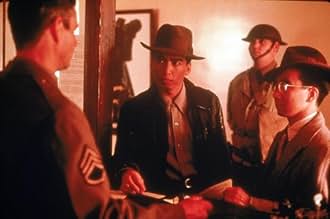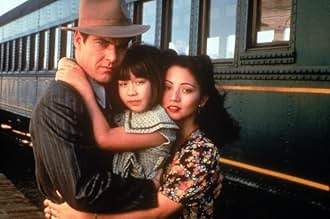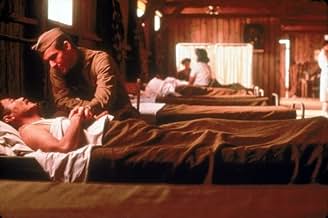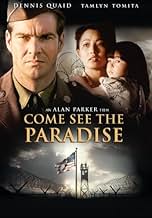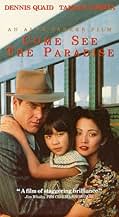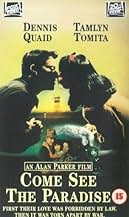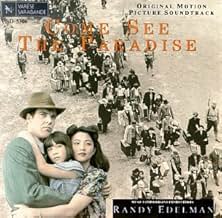Füge eine Handlung in deiner Sprache hinzuThe passionate romance between an Irish-American man and a Japanese-American woman is threatened when the Pearl Harbor attacks happen and the woman is forced into a prison camp because of he... Alles lesenThe passionate romance between an Irish-American man and a Japanese-American woman is threatened when the Pearl Harbor attacks happen and the woman is forced into a prison camp because of her ethnicity.The passionate romance between an Irish-American man and a Japanese-American woman is threatened when the Pearl Harbor attacks happen and the woman is forced into a prison camp because of her ethnicity.
- Auszeichnungen
- 3 Nominierungen insgesamt
Empfohlene Bewertungen
I find the first half an hour or so unnecessary. You are introduced to a Japanese family and their business, and Dennis Quaid's character. His character is actually pretty unnecessary in the movie. He does not really contribute anything to the plot besides being married to a japanese girl. Of course, this was rather odd at the time since the Japanese were considered the enemy, but that is pretty much it in my opinion. The movie could have retold the exact same story and saved us about 45 minutes in telling us about Japanese internment without the use of his character. THis is not to say the movie is bad, but it is pretty long for no reason other than to include an american that you are supposed to be inclined into liking.
The movie itself is centered around a cliché, star-crossed love story, leaving the majority of the historical features of the film as bits and pieces that are seemingly tacked on to give the film its validity. More than half of the film is spent on (albeit, poor) character development and introduction of the main conflict. As a result, the parts of the film that deal with internment and other injustices faced by people of Japanese descent are framed inherently as secondary aspects of the story. Internment and relocation were used as plot devices. Tense racial and/or ethnic conditions within camps and society are played down to make Jack and Lily's love more plausible. In many cases, Nisei and Issei were faced with systemic and often violent anti-Japanese sentiments that posed threats to personal wellbeing. In the camps, conditions were unsanitary and, due to the material losses some people suffered when forced to leave their houses so quickly during the relocation process, many internees were not able to afford appropriate medical care. This aspect is largely glossed over in the movie depiction.
While I can go on about the issues I have with this film, I do believe it does a decent job of highlighting some of the important aspects of this period of history. Through the plot, Parker addresses the paradox of citizenship and loyalty, as well as other injustices and racism faced by the Japanese community during the 1930s and 1940s. Before World War II, people of Japanese descent were prevented from receiving citizenship by US immigration policies, but during internment, these people were also asked to swear loyalty to the United States, effectively challenging their identity as either Japanese or American. Similarly, there is some mention of the racism experienced by Nisei and Issei during this time, but it is often more generalized and even misguidedly incorporated into the screenwriting itself.
Come See the Paradise walks the fine line between being historically valuable, and unfortunately frustrating to watch. What it lacks in historical accuracy, it makes up for in typical, sappy, Hollywood romance. This film could not be confused with a documentary, but for those seeking an interesting movie to watch, this is a decent choice if taken with a grain of salt.
However, the difficulty I have with the film concerns--as other reviewers have noted--a wandering and unfocused script. Although Alan Parker allows for an accurate (for the most part) and revealing look at life in the internment camps, we rarely see anything from Jack's (Dennis Quaid) perspective. What happened to him after he went AWOL? How long were they apart? Also, the difficulties that everyone had with the marriage between Lily and Jack are resolved without any discussion. She simply comes home from Seattle and all is forgiven? The cultural tensions and familial disputes were left behind in favor of a highly politicized second half.
In order to fit in the family conflicts and internment episodes, the romance between Lily and Jack is hastened to the point of non-existence in the second half hour. Therefore the audience had little reason to dread their eventual separation, and rejoice in their ultimate reunion.
Finally, on an historical note, the Supreme Court case Korematsu vs. U.S. (1944) upheld the constitutionality of the internment camps. The movie portrayed a victorious Supreme Court decision that allowed for all internees to return to freedom. However, the US government did not officially recognize the unconstitutionality of Executive Order 9066 until 1988, with a Congressional apology and restitution.
Overall, because of the highly-charged emotional potential of the subject matter, I had expected a film with a little more feeling. And if a director/writer is going to make a political movie to illuminate a dark period of American history, he should at least get his facts straight.
Salome
Dennis Quaid and Tamlyn Tomita play the romantic interest of the picture, Quaid playing a regular Joe who comes to work at a movie theater in Little Tokyo, meets the boss's daughter played by Tomita, and soon they fall for each other quite deeply. But as it's forbidden by the girl's father, they still try and sneak away anyway to have their love. Then come the internment camps, the camps created as a homegrown quasi concentration camp for the Japanese, where in Lily is once again with her family, away from her great love. It isn't exactly the most sunny of entertainments, and Alan Parker's writing is nowhere near the level of finesse and maturity his direction has, but there could be a lot worse as far as bludgeoning-over-the-head movie-making. I can also see, from my recollection, that it is understandably one of the least seen of Parker's films.
Wusstest du schon
- WissenswertesThe movie ranks at the No. #1 spot on the top 10 list of most Oscar-bait movies ever made according to research by UCLA sociologists Gabriel Rossman and Oliver Schilke. According to website 'Wikipedia', this movie is "the most deliberate example of Oscar bait in their study of 3,000 films released since 1985. The identification is based on various elements calculated to be likely to draw Oscar nominations, including the previous nominations of [Alan] Parker, the film's setting in Hollywood (including Quaid's projectionist character), and its depiction of a tragic historical event against the background of war and racism. It was only released in a few cities during the last week of that year to make it eligible for the awards. However, it was not nominated for any Oscars and failed at the box office".
- PatzerDuring the destroying Japanese businesses scene, the "I am an American" sign is printed as if from a professional printers, however, it's entirely possible that people had signs professionally printed.
- Zitate
[first lines]
Older Mini McGann: Why are we so early?
Lily Yuriko Kawamura: It's good to be early.
Older Mini McGann: Do you ever worry that you won't recognize him, Mama?
Lily Yuriko Kawamura: You recognize me, don't you?
Older Mini McGann: Well, he might have grown a beard or a moustache or something. And I was so little. I only think I remember him. Do you think he'll remember me?
Lily Yuriko Kawamura: Well, he has all your photographs and all the letters you wrote him, and he has all your school reports
Older Mini McGann: You sent him my school reports?
Lily Yuriko Kawamura: Of course I did. I wanted to let him know how well you were doing. Come on, now. I got some tea and rice cakes here. We'll have a nice talk while we're walking, okay? Let's go.
Older Mini McGann: How far do we have to walk?
Lily Yuriko Kawamura: Not far.
Older Mini McGann: If we have so much time, then why are you walking so fast? I shouldn't have worn these new shoes. I think I have a blister. Mama!
[speaks in Japanese]
Lily Yuriko Kawamura: [replies in Japanese] Try not to think about it. You want to look pretty, don't you?
Older Mini McGann: Can we talk about Papa?
Lily Yuriko Kawamura: Okay.
- Crazy CreditsThe 20th Century Fox logo does not have the fanfare on it.
- SoundtracksKawamura Family Theme
Written by Jake Parker and Alan Parker
Top-Auswahl
- How long is Come See the Paradise?Powered by Alexa
Details
Box Office
- Budget
- 17.500.000 $ (geschätzt)
- Bruttoertrag in den USA und Kanada
- 947.306 $
- Eröffnungswochenende in den USA und in Kanada
- 65.532 $
- 25. Dez. 1990
- Weltweiter Bruttoertrag
- 947.306 $
- Laufzeit2 Stunden 18 Minuten
- Farbe
- Sound-Mix
- Seitenverhältnis
- 1.85 : 1


